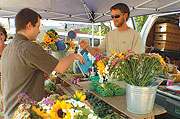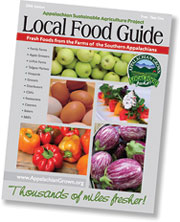
Fresh as it gets: James Harrelsom (at left), a chef at Over Easy Cafe, purchases fresh vittles for the eatery from a local farmer at a tailgate market in Asheville. photo by Jodi Ford
|
Peter Marks is, in effect, in the matchmaking business. He’s the program coordinator for an Asheville-based organization that catalyzes fruitful relationships between compatible parties – but this is no creepy Internet-dating service. Rather, Marks and his nonprofit, the Appalachian Sustainable Agriculture Project, help bridge the gap between Western North Carolina farmers and local consumers. The mission of ASAP is, in essence, to keep our locally owned and operated farms, creameries, groves and other food sources economically viable while still being environmentally responsible.
One of the best ways to achieve this aim, according to Marks, is to make the journey of our food from field to table a bit shorter, which means eliminating as much of the middle person as possible. “Your typical tomato grown on a larger farm goes through six or seven middle-people, and that just drives the price down and down for the farmer,” he explains. “The reason farmers’ markets are so great is that 90 to 100 percent of your dollar is going to the farmer, as opposed to 10 to 20 percent when you buy something that’s not local at the grocery store.”
In addition to farmers’ markets, ASAP promotes such direct-to-consumer efforts as Community Supported Agriculture programs (or CSAs), wherein consumers sign up with farmers to pay for a share of the season’s harvest up front.
 |
Another way ASAP helps close the gap between grower and buyer is by publishing an annual Local Food Guide, a well-designed and immensely useful booklet. At 85 pages in length, the recently released 2006 edition offers a bountiful harvest of information, including: The location of tailgate markets and their dates and times of operation; a map of WNC pinpointing wineries; the exact location of roadside stands; the dirt on which local restaurants are farm-friendly; and specific details about more than 200 independent farms.
With the guide, readers can find out where they can put the kids to work picking apples, for example. ASAP sees serious value in promoting farm-fresh food to children – those future consumers whose minds haven’t yet hardened to unhealthy routines. “We want them to grow up valuing that their food comes from local farms,” says Marks. ASAP has an initiative called Growing Minds – a farm-to-school program that guides little sprouts with a host of hands-on activities. The program gives kids a fresh take on nutrition education with activities like cooking demonstrations, starting school gardens and embarking on field trips to area farms.
“They were eating raw okra off the plants,” says a wide-eyed, still-incredulous Marks of one particularly gung-ho school group. “Kids that aren’t the type to usually eat vegetables. A parent wrote to us and said the next time they were at the store together [the kids] asked for okra.”
An ASAP project targeting adults is the newly published guide called The Mixing Bowl. Essentially, Marks says, the publication is “a matchmaking service for chefs and farmers to find each other.” It will help chefs find the specialty products they want from local farmers, and help growers diversify and expand their businesses.
Though it may be fairly clear to most people how buying local benefits the farmer, it may be harder to understand how the consumer is rewarded, especially when local food sometimes carries a higher price tag. Well, for one, food that travels a great distance loses both flavor and nutritional value, according to an article written by ASAP Director Charlie Jackson in New Life Journal in 2002. Jackson added that the modern model of food production – pesticide-laden, well-traveled groceries that have been genetically engineered to sit pretty on shelves for an unnaturally long time – “incurs environmental clean-up costs that are absorbed at public expense.”
WNC’s farmers, says Marks, are generally of the small, independent sort, so they make less of an environmental impact than big agriculture companies do; less fuel is spent on shipping, for example, and pest control is done on a smaller scale, oftentimes with organic methods. In addition, buying from local farmers stimulates the local economy and helps maintain our region’s heritage.
Perhaps most importantly, says Marks, people who buy local food, especially at a farmers’ market or through CSAs, get the chance to reconnect with and appreciate where their food really comes from. Understanding the significance of that connection, he argues, is as important for the consumer as it is for the farmer.
Look for the The Local Food Guide and The Mixing Bowl at local businesses, or read the publications online at www.AppalachianGrown.org. Contact ASAP at 236-1282.


Before you comment
The comments section is here to provide a platform for civil dialogue on the issues we face together as a local community. Xpress is committed to offering this platform for all voices, but when the tone of the discussion gets nasty or strays off topic, we believe many people choose not to participate. Xpress editors are determined to moderate comments to ensure a constructive interchange is maintained. All comments judged not to be in keeping with the spirit of civil discourse will be removed and repeat violators will be banned. See here for our terms of service. Thank you for being part of this effort to promote respectful discussion.